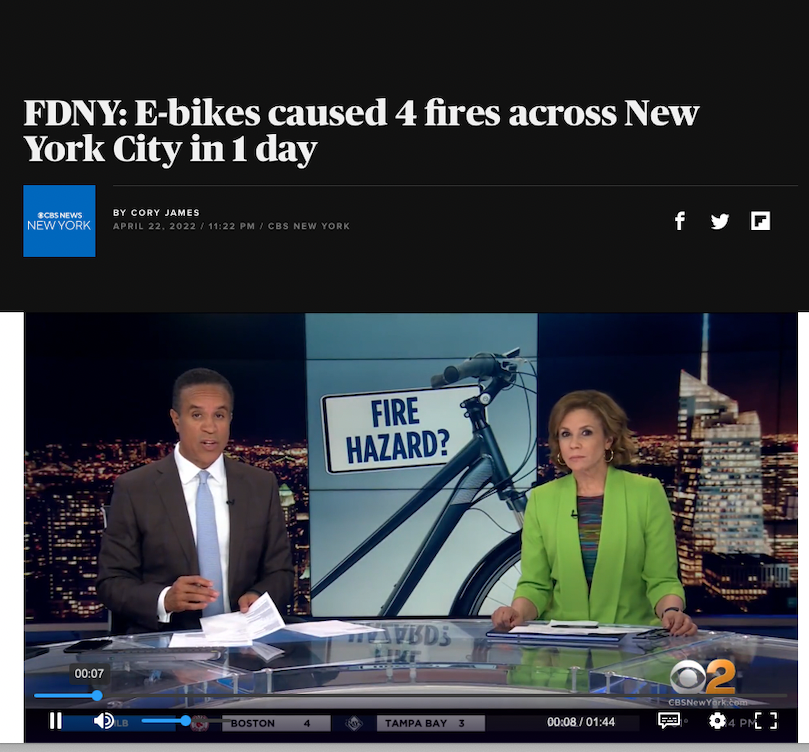NEW YORK (BRAIN) — The New York City Fire Department’s warning last week on the dangers of lithium-ion batteries — combined with a fire at a Florida bike shop, apparently caused by a charging battery — caught the industry’s attention and shined a brighter light on the topic of battery safety.
But some of the industry’s leading experts on e-bikes would like to point out that none of the New York fires occurring April 20 and 21 involved an e-bike — at least not according to how most members of the specialty bike industry define “e-bike.”
Inside the industry (and according to federal regulations) an e-bike has pedals and an electric assist motor. Electric scooters and electric motorcycles don’t have pedals. But outside the industry, fire officials and the mainstream media don’t seem to see the distinction. Many of the most tragic battery fires in the city in recent years have originated with electric scooters, including at least four of the five fires last week.
Now, some fires certainly originate with e-bike batteries and some e-scooter batteries are probably safe. But the mainstream e-bike industry has developed regulations, standards, education programs, a generic e-bike owners manual, and a battery recycling program. There is no evidence the low-priced e-scooter industry has done the same.
Larry Pizzi says the low-priced vehicles are coming from “rogue” importers.
Pizzi leads the PeopleForBikes e-bike committee and is chief commercial officer of Alta Cycling Group. He's been a champion of e-bikes for years. Every time he hears the term “e-bike” used to describe a low-priced e-scooter, he sees trouble ahead for the mainstream e-bike industry.
“This is exactly the challenge we have as an industry. We are working hard to be responsible, with third-party testing and working with UL standards and developing battery recycling programs … then we have rogue companies that bring in electric scooters from China without any kind of regulations, and it creates a bad image.”
Pizzi suggests that retailers and consumers only buy e-bikes that have been certified by third-party testing labs, to the UL standard or other relevant standards.
“All they (retailers) have to do is ask the brand to provide proof of the testing,” Pizzi said.
Lithium-ion batteries are used in both expensive and cheap e-mobility vehicles. The challenge is educating the industry and consumers about the difference, said e-bike industry consultant Mike Fritz. He said Panasonic, LG, and Samsung cells are the best, safest, battery cells. He doesn't recommend cells coming from China.
“I don’t think people have made the connection between below-par battery packs and the incidents of fires,” Fritz told BRAIN. “It’s obvious to me who’s looking at it all the time, and I’ve been predicting it,” he said.
Fritz said a quality battery pack sells for about $300, so it’s unlikely that a complete bike that includes such a battery could retail for $800.
“Now, whether or not that’s resonated yet with consumers, dealers, and the rest of the industry … I suspect the industry is starting to get the point. But we have more work to do to get this message out."
There is no federal requirement that e-bike batteries meet any particular standard, leaving it up to the industry to self-police (with third-party labs).
“It’s buyer beware,” Pizzi said.
Pizzi said the PeopleForBikes e-bike committee is monitoring the situation in New York, where low-cost e-bikes and e-scooters are popular with food delivery and messenger services.
“We know FDNY is looking closely at this, and it’s possible they might adopt certain regulations at some point. We want to keep an eye on that because other jurisdictions could follow them,” he said.
Not e-bikes
On its Twitter account last week FDNY reported five incidents between April 20 and April 21 involving lithium-Ion batteries. In four of the incidents, NYPD said the fires were caused by lithium-ion batteries on an “electric scooter/e-bike.” The fifth incident involved a lithium-ion battery and FDNY did not say if the battery was from an electric vehicle or some other kind of device.
In the four incidents where an “electric scooter/e-bike” was mentioned, two of the department’s Twitter postings show photos of burned electric scooters without pedals; on the other, FDNY investigators later said the fire was caused by an “electric scooter.” The other posting about a fire shows a burned-out electric motorcycle with no pedals.
In most FDNY announcements and in the New York media, it’s clear that for them the term “e-bike” is synonymous with any light electric vehicle, including electric scooters and motorcycles. For example, in the CBS News New York screenshot shown below, the TV station put a photo of an electric bicycle behind the announcers, even though the fires in question were determined to have been caused by an e-scooter. 
FDNY’s statement about lithium-ion batteries last week did not specifically mention e-bikes, but FDNY officials, including recently retired Fire Commissioner Daniel Nigro, have consistently used “e-bike” to refer to all lightweight electric vehicles.
Still, no one is saying that FDNY doesn't have good advice when it comes to battery safety.
The FDNY Twitter account pointed city residents to its video on rechargeable battery safety. In the video, the department shows images of cordless vacuums, cell phones, laptops, power tools, cameras, drones, e-bikes and e-scooters. The video recommends that consumers “purchase and use devices that are certified by a qualified testing laboratory.”
FDNY also recommended that consumers follow the manufacturer’s instructions for charging and storage, use only the manufacturer’s recommended charger or adapter, keep devices at room temperate and not in direct sunlight, store batteries away from anything flammable, and call 911 if a battery overheats, emits an odor, changes shape, or leaks. It also noted that it is illegal to discard rechargeable batteries in trash or recycling. Instead, the batteries should be taken to a battery recycling location.




